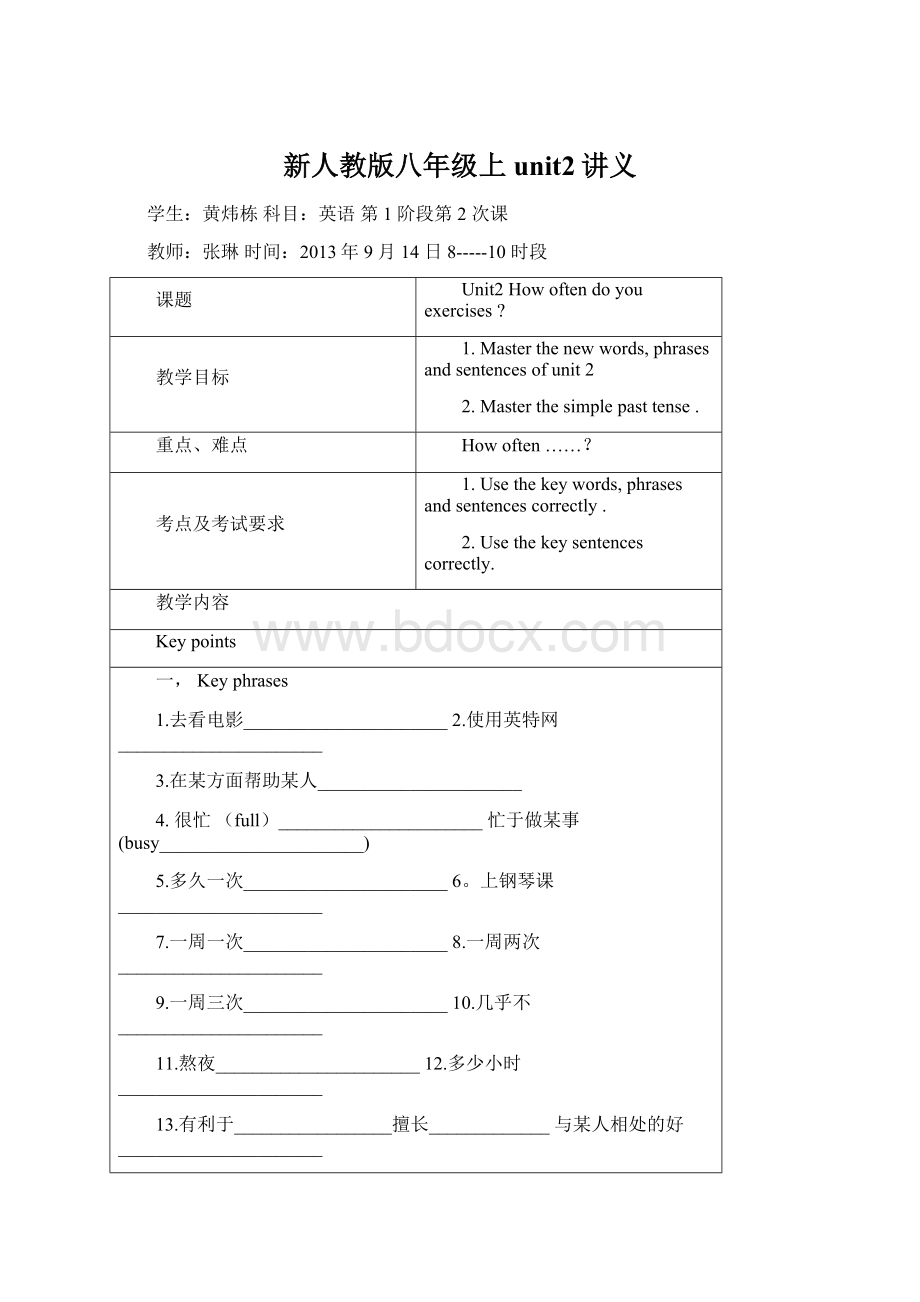新人教版八年级上 unit2讲义.docx
《新人教版八年级上 unit2讲义.docx》由会员分享,可在线阅读,更多相关《新人教版八年级上 unit2讲义.docx(14页珍藏版)》请在冰豆网上搜索。

新人教版八年级上unit2讲义
学生:
黄炜栋科目:
英语第1阶段第2次课
教师:
张琳时间:
2013年9月14日8-----10时段
课题
Unit2Howoftendoyouexercises?
教学目标
1.Masterthenewwords,phrasesandsentencesofunit2
2.Masterthesimplepasttense.
重点、难点
Howoften……?
考点及考试要求
1.Usethekeywords,phrasesandsentencescorrectly.
2.Usethekeysentencescorrectly.
教学内容
Keypoints
一,Keyphrases
1.去看电影______________________2.使用英特网______________________
3.在某方面帮助某人______________________
4.很忙(full)______________________忙于做某事(busy______________________)
5.多久一次______________________6。
上钢琴课______________________
7.一周一次______________________8.一周两次______________________
9.一周三次______________________10.几乎不______________________
11.熬夜______________________12.多少小时______________________
13.有利于_________________擅长_____________与某人相处的好______________________
14.在他们的业余时间_____________________15.问某人关于某事______________________
16.一点也不______________________17.上网______________________
18.对……感到惊讶______________________19.至少______________________
20.问题的答案______________________21.通过使用英特网______________________
22.例如,像______________________23.与某人一起度过一段时间______________________
24.一个十六岁的中学生______________________25.像……一样______________________
26.害怕去做某事______________________27.超过两个小时______________________
二.Keypoints
SectionA
1.helpwithhousework帮助做家务
(1)helpwithsth.意为“帮助做某事”
拓展:
helpsb.withsth.=helpsb.(to)dosth.帮助某人做某事
Eg:
IoftenhelphimwithhisEnglish.=Ioftenhelphim(to)learnEnglish.我经常帮他学习英语。
(2)housework意为“家务劳动”。
不可数名词。
1.Theyhavehouseworktodo.
A.manyB.much
2.sometimes有时
辨析:
sometimes,sometimes,sometime,sometime
sometimes有时候。
=attimes也是“有时”的意思。
sometimes几次。
time作可数名词时可作“次数”解;表示“时间”时是不可数名词。
sometime某个时候。
可指过去或将来的某个时候。
sometime一段时间。
常与for连用。
对它提问用howlong。
口诀记忆:
分开“一段时间”;相聚“某个时候”。
Eg:
SometimesIgetupverylate.有时我起床很晚。
Iwillgotoshanghaisometimenextweek.下周某个时候我要去上海。
Hereadsthestorysometimes.他读这个故事几遍了。
I’llstayhereforsometime.我将会在这儿呆一段时间。
Exercises
①WeplantostayinHainanfor.我们打算在海南呆一段时间。
②Iamsurethatwehavemetbefore.我肯定我们之前见过几次了。
③Ihavelettersfromhim.有时我会收到他的来信。
3.hardlyever几乎不
hardlyever相当于hardlyeg:
Thereishardlyanyfoodleft.几乎没有食物剩下。
辨析:
hardly与hard
hardly几乎不,一般位于动词之前。
hard努力,位于动词之后。
eg:
Hehardlyworks.他几乎不工作。
Heworkshard.他工作努力。
4.usetheInternet用互联网
usesth.todosth.用某物做某事eg:
Iuseaknifetocutbread.我用刀切面包。
短语:
ontheInternet在网上,surftheInternet网上冲浪,上网
5.What’syourfavoriteprogram?
你最喜欢的节目是什么?
句型:
What’syourfavorite...?
=What...doyoulikebest?
你最喜欢的......是什么?
What’syourfavoriteanimal?
=__________________________________________
6.Areyoufreenextweek?
你下周有空吗?
free意为“空闲的,有空的”,反义词busy。
befree意为“闲着,有空”
eg:
:
Heisfreenow.他现在有空。
拓展:
free还可译为“免费的”Eg:
Theticketsarefree.票是免费的。
7....nextweekisquitefullforme...…下周对我来说相当忙…
quitefull很忙,相当忙.
拓展:
1.full还可译为“满的,充满的”。
Eg:
Thebuswasfullwhentheygotthere.翻译________________________________________
2.full还可译为“饱的”。
Eg:
Ican’teatanymore,Iamquitefull.我不能再吃了,我相当饱了。
8.Howcome?
怎么回事?
怎么会?
本句用来表示对某事感到很奇怪,有点想不通。
9.Ihavedanceandpianolessons.我要上舞蹈课和英语课。
have在此意为“上……课”。
Eg:
They’rehavinganEnglishlesson.他们正在上英语课。
扩展:
havelessons上课,LessonOne第一课
10.Well,howaboutTuesday?
哦,那周二呢?
Howabout...?
(=Whatabout...?
)意为“……怎么样?
”,用来征求对方的意见。
Eg:
Howaboutthisbook?
这本书怎样?
How/Whataboutdoingsth....?
做……怎么样?
Eg:
---WhatwillwedoonSunday?
---Howaboutvisitingthemuseum?
It’ssunnytoday,Whatabout________(play)tennis?
11.Igotothemoviesmaybeonceamonth.我大概每月去看一次电影。
gotothemovies________________
maybe意为“也许,大概,可能”,常位于句首。
Eg:
MaybeheknowsTom.也许他认识Tom。
辨析:
maybe和maybe
maybe“也许,大概,可能”。
(一般放句首)
Maybeyouareright.也许你是对的。
maybe“可能是,也许是”。
为“情态动词+be动词”结构。
(位于句中)
Youmayberight.你也许是对的。
1.LilyanEnglishteacher.Lily可能是一名英语老师。
=________________________________________
12.Heplaysatleasttwiceaweek.他至少每周踢两次(球)。
atleast意为“至少”。
其反义词为atmost“最多”。
Eg:
Thereareatleast1,500studentsinourschool._____________________________________。
SectionB
1.Butmymotherwantsmetodrinkit.但我妈妈想让我喝它。
wantsb.todosth.意为“想让某人做某事”,否定形式为wantsb.nottodosth.意为“不想让某人
Doyouwant(tell)meanything?
2.Shesaysit’sgoodformyhealth.她说它对我的健康有好处。
begoodfor意为“对……有益”。
反义词为bebadfor“对……有害”。
Eg:
Vegetablesaregoodforyou.蔬菜对你有好处。
拓展:
begoodat擅长...begoodatdoingsth.擅长做...
Iamgoodat(play)basketball.
3.Lastmonthweaskedourstudentsabouttheirfreetimeactivities.
asksb.aboutsth.“询问某人关于某事”
Eg:
Iaskedmyteacherabouttoday’shomework.____________________________________。
4.Herearetheresults.这是(调查)结果。
here位于句首,句子要倒装。
Eg:
Hereisyourjacket.这是你的夹克。
5.…twentypercentstudentsdon’texerciseatall.…百分之20的学生根本不锻炼。
1.百分数由percent来表示,构成:
基数词+percent。
Eg:
Seventypercentoftheboyslikeplayingcomputergames.男生中70%喜欢完电脑游戏。
2.not...atall意为“一点儿也不,根本不”。
Eg:
Idon’tknowaboutitatall.对那件事我一点也不知道。
拓展:
notatall=youarewelcome意为“不用谢,不客气”。
Eg:
--Thankyouforyourhelp.--Notatall.
6.Althoughmanystudentsliketowatchsports,gameshowsarethemostpopular.
although连词。
意为“虽然,尽管”。
but意为“但是”。
英语中,although与but不能同时使用。
Eg:
Althoughitrained,theboysstillplayedoutside.=Itrained,buttheboysstillplayedoutside.
Mycousinknowsalotaboutgeography,heisonlyfouryearsold.
A.becauseB.soC.although
7.ItisgoodtorelaxbyusingtheInternetorwatchinggameshows.
句中it为形式主语,真正的主语是后面的动词不定式短语。
此句型结构为:
It’s+adj+(forsb.)+todosth.意为“(对某人来说)做某事是……的”。
Eg:
It’sveryimportanttolistencarefullyinclass.It’seasyforustoswim.
It’sveryhardforhimtostudyEnglish._____________________________________
---Ioftenhavehamburgersforunch.---You’dbetternot.It’sbadforyoutoomuchjunkfood.
A.eatB.toeatC.eatingD.ate
8.Exercisesuchasplayingsportsisfun,andyoucanspendtimewithyourfriendsandfamilyasyouplaytogether.
suchas意为“比如,例如”Eg:
Ihavealotofhobbies,suchasreadingandsinging.
spend意为“度过”或“花费(时间、金钱)”。
Eg:
Comeandspendtheweekendwithus.来和我们一起度过周末吧
重点:
1.spendtime\moneyonsth.在......上花费时间或金钱
Hedidn’tspendmuchtimeonhishomework.他没在作业方面花很多时间。
Ispend200yuanonanewcoat.____________________________________
2.spendtime\money(in)doingsth.花费时间或金钱做某事
Don’tspendtoomuchtimewatchingTV.不要花费太多时间看电视。
Healwaysspendhistimeplayingfootball.________________________________
Eg:
Ienjoyplayingcomputergames,butIcan’ttoomuchtimethat.
A.take,doingB.spend,doingC.spend,fordoingD.take,todo
9.However,shehassomebadhabits,too.
however意为“然而,不过”。
可以位于句首、句中、句末。
但要用逗号与句子的其他部分隔开。
Eg:
Shewasill.However,shestillwenttowork.她病了,然而她依然去上班。
辨析:
but和however
but“然而,但是”。
可直接连接前后两个句子,表转折关系。
However“然而,但是”。
不能直接连接句子,必须用逗号与句子隔开。
Eg:
1.Itbegantorain,,wewentouttolookfortheboy.
2.Itasunnymorning,verycold.
10.SheusuallywatchesTVformorethantwohoursaday.
morethan相当于over。
意为“超过,多余Therearemorethan2000books.____________________
11.Shesayssheisafraid.她说她害怕。
1.beafraidtodosth.害怕做某事Eg:
Iamafraidtotravelbyplane.我害怕乘飞机旅行。
2.beafraidofsb.\sth.害怕某人\某物beafraidofdoingsth.害怕做某事
Eg:
Sheisafraidofthedog.她害怕那只狗。
Don’tbeafraidofaskingquestions.不要怕问问题。
beafraidtodosth.=害怕做某事
12.Lessthansix.
Lessthan意为“不到,少于”。
其反义词为morethan\over“多余,超过”
Eg:
Shesleepslessthansevenhourseverynight.他每晚的睡眠时间不到7小时。
WeknowTomfor20years.我们认识Tom超过20年了。
三.Grammar:
频度副词
1.频度副词:
表示动作发生间隔(既频率)的副词。
它们有:
always;usually;often;sometimes;
seldom;hardlyever;never等。
2.howoften意为“多久一次”,用来提问在某一段时间内进行某个动作的频率。
其回答通常是
often、sometimes、never、hardlyever、always、onceaday、onceaweek等等表示频率的副词
或是短语。
例:
---ShehardlyeverwatchesTV.(划线提问)---HowoftendoesshewatchTV?
例句理解:
1.—Whatdoyouusuallydoonweekends?
—Ioftengotothemovies.
2.—Howoftendoyoushop?
—Ishoponceaweek.
3.频度副词:
表示频率不确定
频率短语表示频率确定
(1).不确定的频度副词
always(100%)>usually(约80%~90%)>often(约60%)>sometimes(约30%)
>seldom(约20%)>hardlyever(约10%)>never(0%)
(2)表示确定的频率短语
everyday/week/month/yearonceaweektwiceaweektwiceamonththreetimesaday
注:
三次或三次以上一般用“基数词+times”表示。
(3)在句中位置:
频度副词在句中通常放在be动词、助动词、情态动词之后,在实义动词之前。
例:
Sheisoftenlateforschool.Icanneverbesure.Healwayshelpsme.
Exercises
一、对划线部分提问
1)Healwaysplaysbasketballafterschool.
_______doeshealways_______afterschool?
2)Theyhardlyeverplayfootball.
________________________theyplayfootball?
二、单项选择
( )1.---Howoften______sheexercise?
---Twiceaweek.
A.do B.does C.doing D.did
( )2.I______liketodrinkmilk.
A.not B.doesn’t C.don’t D.no
()3.---______doyougoswimming?
---Sometimes.
A.HowoftenB.HowlongC.howmanyD.Howold
()4.KatrinawatchesTVonce______week.
A.aB.theC.anD.﹨
Howoften和Howmanytimes
①Howoften用来提问某个动作间隔多久发生一次,即询问动作发生的频率。
通常对一些表示频
率的副词进行提问;也可以对频度短语进行提问。
②Howmanytimes意思是“多少次”,用来提问做某事的次数,往往就once,twice,threetimes等
词语进行提问。
典型例题:
1)LiMingdoeshishomeworkeveryday.(就划线部分提问)→
HowoftendoesLiMingdohishomework?
解析:
everyday属于频度短语,就频度短语提问用Howoften.
2)Theoldmanwenttothezoothreetimesthisyear.(就划线部分提问)→
Howmanytimesdidtheoldmangotothezoothisyear?
解析:
这里就次数提问用howmanytimes.
Exercises
用所给词的正确形式填空
1.IwatchTV_________(one)aweek.2.HewatchesTV_________(two)aweek.
3.Katrina__________(exercise)everyday.
Exercises
一,单项填空
()1.__________heisill,__________hegoestoschool.
A.Although,butB./,/C.Al